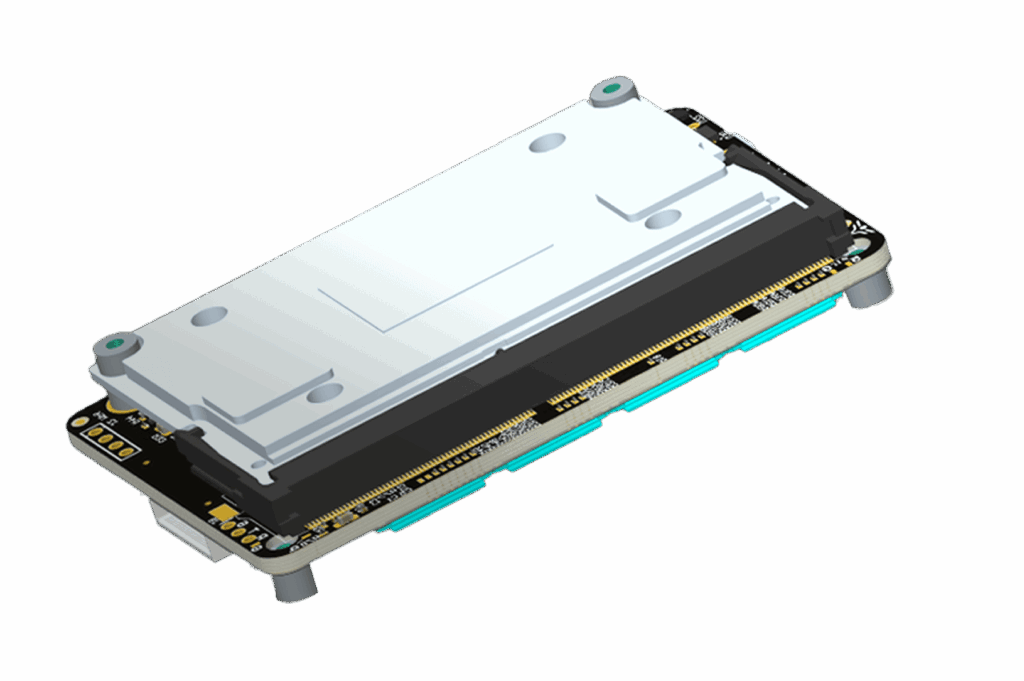
Tycho.AI’s Voyager chipset. (Image: Tycho.AI)
Tycho.AI, a startup developing autonomous navigation software for fast, low-flying drones in GPS-jammed environments, on Oct. 7 emerged from stealth with a $10 million Series A round to scale the company’s engineering team and expand testing of its technology.
FirstMark led the funding round.
With Tycho.AI’s software, the goal is for unmanned aircraft systems to be able to fly 200 miles per hour at less than 25 feet above the ground, and in the case of flight over open water or desert terrain, with less than 1 percent deviation for navigation, Thom Kenney, the Cambridge, Mass.-based company’s CEO, told Defense Daily in an interview. While satellite or other maps can be used for above ground flight, the company’s technology “maintains virtually zero drift, typically within one to 10 meters depending on altitude and environment,” he said.
Tycho.AI has also developed computer vision technology for object detection and avoidance as part of its autonomous navigation solution, he said.
Being able to autonomously navigate at very low altitudes will enhance the survivability of drones, Kenney said. A lesson the company is learning based on drone operations in the ongoing war in Ukraine is that survivability is challenging at altitudes between 100 and 5,000-feet, he said.
The company has been testing its edge autonomy technology using small quadcopter drones but wants to expand to fixed-wing and rotary-wing unmanned systems provided by other vendors, Kenney said. Tycho.AI also wants to test in more locations and environments.
In September, Tycho.AI tested its system in a drone flying over the green waters of the Atlantic Ocean, but the company would like to assess its solution in the Pacific Ocean near Hawaii where the water color and winds would be different, Kenney said. Tycho.AI is also interested in going to an unmanned aircraft system test facility hosted by New Mexico State Univ. because that area offers a different terrain environment than in New England, he said. The company is also interested in doing tests with the Army and Special Operations Command in different environments, he said.
Instead of using graphics processing units (GPUs) like those supplied by Nvidia for its autonomous navigation, Kenney said the company is using field-programmable arrays (FPGAs) and application-specific integrated circuits (ASICs) in the chipsets it has designed for their “extreme speed and power efficiency for edge-based autonomy.” These circuits are “smaller, faster, and more energy-efficient than general purpose processors” and “once built, they’re far more cost effective for high-volume, mission-critical applications like visual navigation and onboard AI,” he said.
However, for applications requiring more complex computer vision models, the solution might require the Nvidia chips, and Tycho.AI’s system would be a part of the solution, Kenney said.
Tycho.AI calls its chipset technology Voyager, which is the size of a credit card, a quarter-inch thick, and weighs less than seven ounces, Kenney said. He expects the size of Voyager to shrink further, adding “the weight is so light that it will have a marginal impact on virtually any type of aircraft that’s out there to be able to provide this level of autonomy.”
The types of missions Kenney envisions Tycho.AI’s autonomous navigation system enabling include intelligence, surveillance and reconnaissance, and counter-UAS. The company also has a path forward to developing autonomous technology to enable drone swarming, he said.
Tycho.AI’s drone autonomy technology grew out of research conducted by the company’s founder Sertac Karaman at his lab at the Massachusetts Institute of Technology. The company was established in November 2022 and currently has 22 employees. Kenney is a Lt. Col. in the Army Reserve who has deployed to Afghanistan and Africa.
An earlier $2 million seed round was led by Pillar VC.
Tycho.AI has also benefited from more than $5 million in Small Business Innovation Research contracts over the past 15 months with the Air Force’s AFWERX innovation arm, the Strategic Capabilities Office, and a Tactical Funding Increase with the Air Force Research Laboratory.
A version of this story originally appeared in affiliate publication Defense Daily.